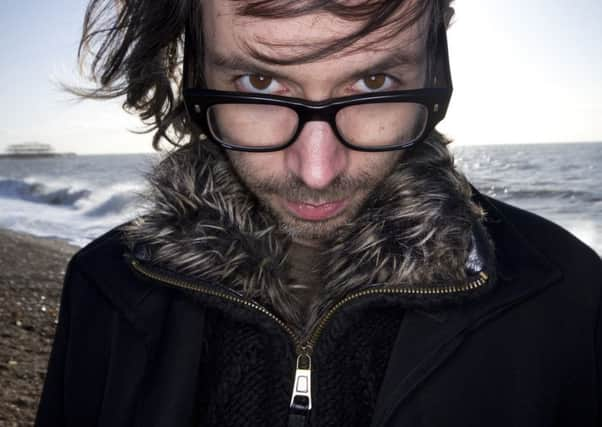James Rhodes: How music triumphed over all


IN a world comfortable with pigeonholes, he has been likened to Russell Brand and Jamie Oliver.
He’s a classically trained pianist who hates the term “classical music”. He has “Sergei Rachmaninov” tattooed inside his right forearm, and is as likely to perform at the Latitude Festival or a “pop-up” gig in a bar or club as he is to be heard at the Wigmore Hall.
Advertisement
Hide AdAdvertisement
Hide AdHe plays, wherever he is, in jeans and trademark stripy tee-shirt. The hair is, let’s face it, from the “dragged through a hedge backwards” school. He has permanent stubble, trendy “nerd” specs and he smokes. He writes his own programme notes, and chats about the tics, habits, obsessions and sometimes the sexual proclivities of his favourite composers before he sits down to play.


The stiffly formal and distant aura of the classical concert is ripe for revolution, he says, and James Rhodes, 39, is that revolution personified. Yet, or all the informality surrounding his persona, Rhodes believes in playing the music with deadly seriousness.
In the last few years he has begun to change the way classical piano is perceived, but he says that even on a very good day – with four to six hours’ practice in daily preparation – his recitals are only ever “good enough”. But he’s been known to receive such prolonged standing ovations that only five encores will mollify his army of fans, who include high profile names such as Stephen Fry, Benedict Cumberbatch, Derren Brown and David Tang.
Because of his edgy persona and the passionate, even political way he communicates his love of music via blogs and other writing as well as his on-stage mission to explain and excite in words as well as music, Rhodes attracts audiences that include many under-25s. That’s a revolution. After many of his gigs he mingles with the audience, and says the most frequent comment, apart from “let’s see your hands”, is a wistful lament that they “used to play” an instrument at some time in the past.
Advertisement
Hide AdAdvertisement
Hide AdHe wants everyone to “find their inner artist” as he did, so that they will feel the transformative power of music – whatever kind of music they choose. He says music found him and it became not only life-enhancing but also life-saving. That is no exaggeration.
He was born into a “nice, middle-class, Jewish north London family”. It was not until he was into his 20s that he spoke about the physical and emotional abuse he suffered at the hands of a gym teacher over a five year period at his primary school.
“These people are very clever, they know how to keep you quiet and my parents knew nothing.” The abuse led to serious spinal injury and three bouts of surgery. Eventually Rhodes changed schools and went on to Harrow.
“Before I had good music lessons I had spent years listening to my dad’s classical CDs, and they were a solace, my escape. I taught myself to play the piano and would really go at it, but by the time I had serious lessons there were some very bad habits that needed to be unpicked.”
Advertisement
Hide AdAdvertisement
Hide AdHe improved enough to win a scholarship to the Guildhall School of Music, but a combination of mental health problems, drink and drugs plus pressure from his father meant he instead studied psychology at university.
In his younger years he had imagined playing piano on a platform to a rapt audience. But for 10 years he lost his way, lost his music, playing not one note while he instead worked in the City, which he looks back on as “a decade of slow death by greed”. Along the way he married an American woman and had a son called Eddie.
When he could bear the nine-to-five no longer “and the pain of not doing it got greater than the pain of doing it”, James Rhodes thought perhaps a career of some sort in music might be possible, maybe as an agent. He met a famous agent who asked him to play.
Despite the rustiness of his technique: “His reaction was that I should perform, but first I needed to be taught by the celebrated teacher Edoardo Strabbioli in Verona.”
Advertisement
Hide AdAdvertisement
Hide AdAfter five years of travelling back and forth for intensive our-day tutorials each month with Strabbioli and practising for many hours a day at home, Rhodes’s marriage disintegrated and he had a breakdown. He was sectioned to a mental hospital and was “diagnosed with ******* everything – schizophrenia, manic depression, the lot.”
He spent nine months in hospital and now says it was a breakdown that needed to happen. He had never talked about or acknowledged the child abuse, and working through the years of agony and silence took him to the brink of suicide. A friend got him to listen to Bach during his recovery, and he says the music had a tremendous effect on his rehabilitation.
“I talk about it now and then, not all the time. But it is something that needs to be talked about openly, not hidden away. Today people would have been all over it – if things had been the same back then, I don’t think I’d have had to suffer in silence.” His horrified family only found out about the abuse in 2007.
“It will always be part of who I am, and I suppose it feeds into the kind of performer I am.” After a long spell of treatment in different institutions, he met and was signed up by his manager Denis Blais, and in 2009 his first album Razor Blades, Little Pills and Big Pianos was an instant success. Since then, his talent, approach and gift for communication have found him an ever-growing audience.
Advertisement
Hide AdAdvertisement
Hide AdHe was the first classical musician to be signed up by the rock imprint of a major label when he won a deal with Warners. He tours the world playing the music of his heroes and his latest album, 5, has been released on his own label, Signum.
As artist-in-residence at Harrogate International Festivals, later this month Rhodes will perform in two very different venues, both gigs marked by the interactivity he prefers. “It’s all about connecting and about the music, not about the performer being a mystical genius shrouded in their own bull****”
Since he arrived on the musical scene he has been courted by television, and a last year took a piano and cameras into a mental hospital to play individual recitals to patients he had come to know in the hope that they would find a similar solace in it as he had experienced.
His latest TV project is The Great Instrument Amnesty, three programmes in which he is seen working with an under-achieving primary school in Essex which has been placed in special measures by Ofsted.
Advertisement
Hide AdAdvertisement
Hide AdHe believes government cutbacks affecting music education are starving the next generation of greats, their potential languishing idly on the sofa, pigging out on a vitamin-free diet of talent shows. Persuading individuals and bands to donate old instruments that can be reconditioned and given to children for free, alongside tuition from Rhodes and other professional musicians, he is out to do for music education what Jamie Oliver did for school dinners.
“During my research I went to places where the annual budget per child for music education was £2.40 – less than the price of a coffee at Starbucks. Children never got their hands on an instrument, and even if they did, no-one could afford lessons.
“I took orchestral instruments to this school in Basildon and persuaded the head to make time in the curriculum for lots of music. Within three weeks of working with the year five children they were playing the final movement of Beethoven’s Fifth Symphony well enough to perform to friends and family.
“It’s my goal that every child who wants to learn to play an instrument gets to learn one, and if it can work in one year group in Basildon it can be rolled out to the whole school and across the country. I’m planning to talk to (Education Secretary) Michael Gove about what he’ll do to support this – seeing as he professes to love Strauss and Wagner and opera.
Advertisement
Hide AdAdvertisement
Hide Ad“It’s not about saying that every child should become a classical musician,” adds Rhodes, who professes to be in this for the long-haul. “Some of them may be the next Harry Styles or Adele – it doesn’t matter. The point is that they’re getting the opportunity. “I see music as a basic human right. It is so good for us on so many levels, including stimulating other brain activity and giving confidence.
“I even heard a teacher saying that two children she could never put next to each other because they fight and cause huge trouble have been transformed since playing in the orchestra, and happily sit side-by-side, getting on with it.”
If anyone knows the healing and transformative powers of music it’s James Rhodes. And if anyone can speak truth to power about its necessity it’s also him – a man whose return from the brink was aided by its potent medicinal powers.
James Rhodes will be performing twice during this year’s Harrogate International Festivals: at 5.30 pm on Thursday, July 24 at Revolution in Montpellier Gardens (free performance and Q and A, but tickets must be booked) and at the Royal Hall, 8pm on Friday, July 25. Box office 01423 562303.
Advertisement
Hide AdAdvertisement
Hide Ad• James Rhodes: The Great Instrument Amnesty will be on Channel 4 later this summer. See channel4.com for details.
The memoir Instrumental by James Rhodes will be published by Canongate on September 9, £16.99.